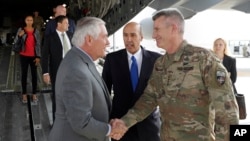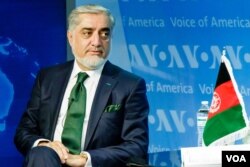The White House’s new strategy for Afghanistan makes a critical change by committing U.S. support “as long as it takes to get the job done,” the departing U.S. ambassador says.
Hugo Llorens, who is leaving after a year on the job and previously served as the U.S. Embassy’s No. 2 official, told VOA’s Afghan service in Kabul the old strategy of having a timeline with a specific end “made it very easy for the enemy to guess our moves, and that is not a good move.”
He called President Donald Trump’s conditions-based approach better for the tangled situation.
Llorens’ sentiments were echoed by Abdullah Abdullah, the country’s chief executive officer, who met Wednesday with VOA editors in Washington. He said having a finite end date allowed the Taliban and other extremist groups to just bide their time “and come back strong,” undercutting the progress made since the U.S. intervention in late 2001.
Abdullah said ousting the Taliban’s repressive regime has improved the lives of millions of Afghans by bolstering individual rights, although “security remains a challenge.”
Taliban gains
While the Taliban has made territorial gains over the past year as the Afghan government focused on protecting urban areas, Llorens said the group has made little headway in winning the hearts and minds of the Afghan people. He cited a recent Asia Foundation poll that found only 5 percent of the populace support the Taliban.
“If you measure by population, the Taliban still control a very small part of country,” the ambassador said. “It doesn't mean they are not a problem; we all know the reality. People are tired of them; they are coming here and bringing death and destruction to the country.”
He underscored the need for Pakistan to play a more positive role in fostering peace.
“They (Taliban) receive support from the country next door, Pakistan,” Llorens said. “The Taliban leadership is in Pakistan, their bases are in Pakistan and their logistics to a significant degree come from Pakistan, their arms, ammunition, their training, and … many young man who are radicalized ... in madrassas.”
Other groups emboldened
Pakistan has denied accusations that it provides terrorist groups safe havens on its land or supports extremist groups in Afghanistan. Islamabad has bristled at pressure from Trump and other officials that it must do more to root out such groups, saying it, too, is a victim of terrorism.
Abdullah called for Pakistan to see the situation with “clarity” because “insecurities created by the Taliban” have emboldened other groups with anti-government agendas that affect the entire region.
That includes Islamic State (IS), which has grown in strength in Afghanistan, with concerns it could build a home there after heavy losses in Iraq and Syria.
Taliban, IS differences
Abdullah said it can be difficult to differentiate between the Taliban and IS because their ideologies, distortion of Islamic ideals, and methods of terror and violence are similar. So far, he said, IS is concentrated in specific areas and has more foreign fighters than the Taliban.
Llorens says a key difference is there is hope the Taliban can be convinced to negotiate peace.
“I do not think there is any way we can reconcile with ISIS,” Llorens said, using an acronym for the group. “The only way is to fight them, and our objectives working with our Afghan partners are to completely eliminate the ISIS threat from Afghanistan and the entire central and South Asia region.”
Pakistan unhappy
Pakistan also is unhappy that Trump’s strategy includes a bigger role for archrival India to help stabilize Afghanistan, with officials saying in recent days only countries that border Afghanistan should be allowed to be directly involved.
Abdullah countered that India has provided more than $2 billion in aid for Afghan education, infrastructure and energy development, and trade ties are growing. India provided air transport for Afghan goods during times when Pakistan has closed border crossings.
Llorens, meanwhile, is concerned about reported Russian and Iranian influence on the Taliban.
VOA's Afghan Service in Washington contributed to this report.





